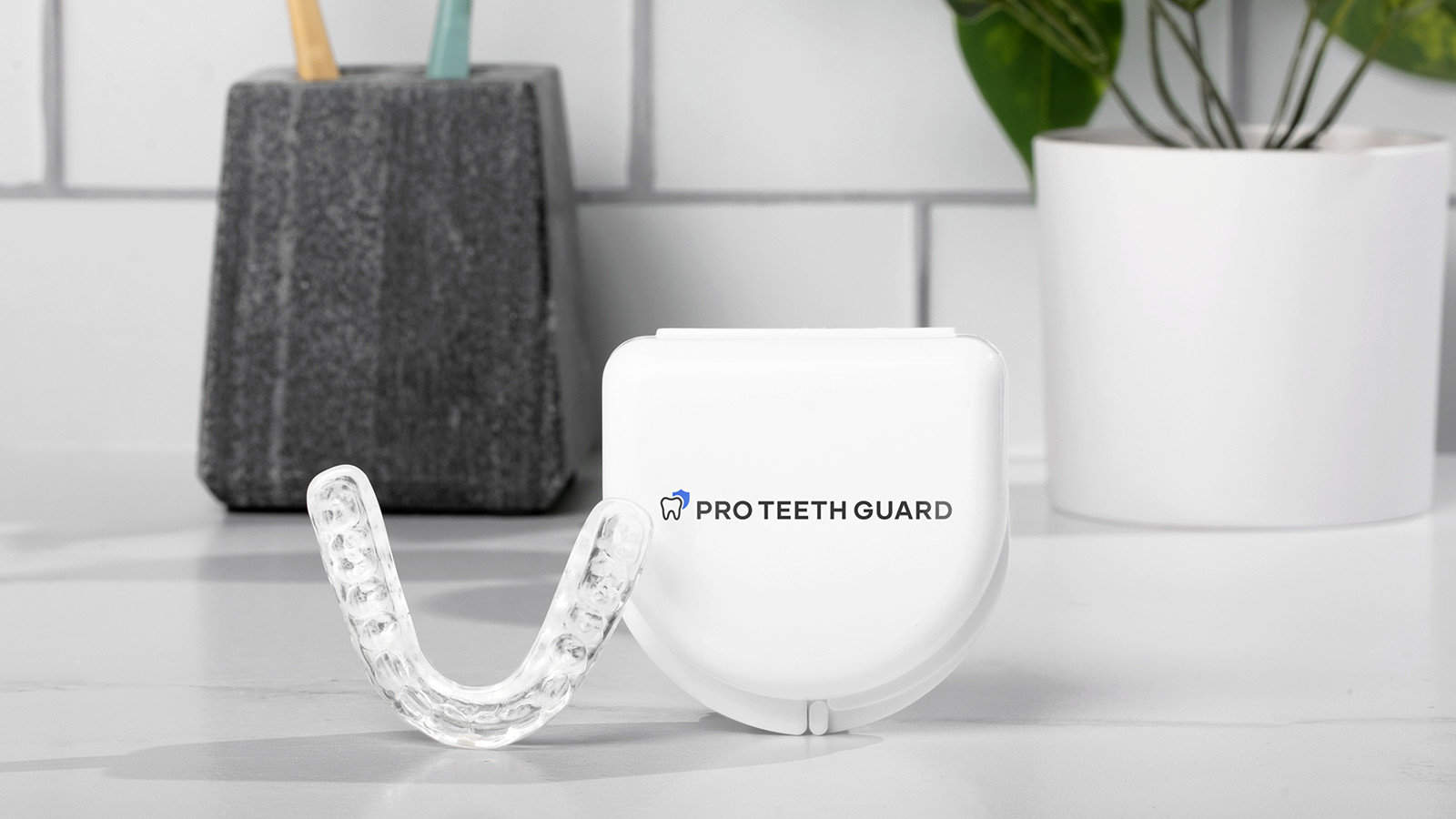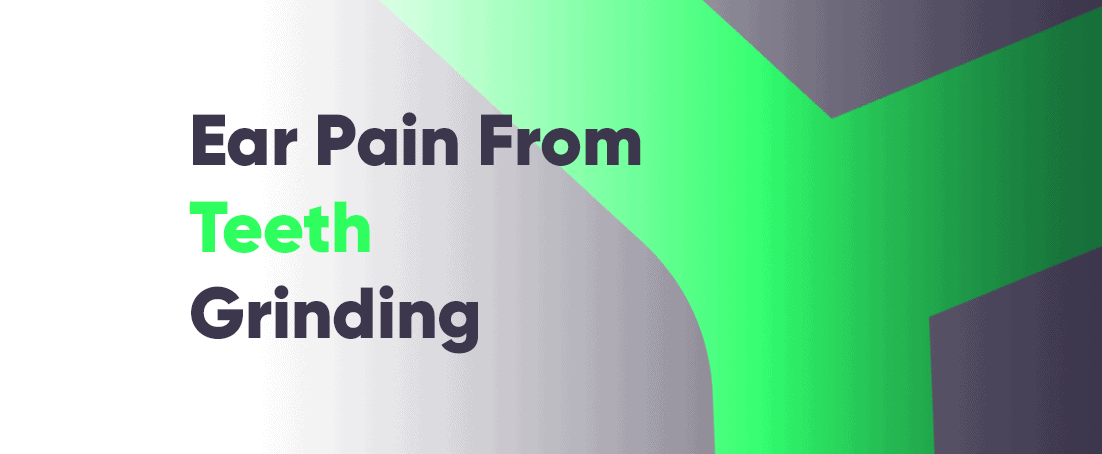Bruxism often correlates with ear pain but whether one causes the other is not that easy to know. The medical reason for them coming together is the temporomandibular joints (TMJ) proximity to the ear structures. The nerves and muscles in our body are interconnected so pain in one area can transfer to the other.
Scientific research highlights that bruxism-induced ear pain is difficult to diagnose as multiple factors are at play. Here, I will outline the main symptoms and prevention methods. Knowing them has helped me and countless others to take the necessary steps to reduce earaches.
Table of Contents:
How Teeth Grinding Affects Ear Health
The connection between bruxism and ear health might not seem so obvious. Unconscious clenching is more commonly associated with tooth damage or jaw pain. But ear health is also heavily influenced by bruxism due to anatomical reasons.
Bruxism and Earache
Bruxism is the chronic and non-functional clenching or grinding of teeth. It’s often unconscious and most pervasive during sleep, which results in the temporomandibular joint (TMJ) being strained by the repeated jaw movement.
Solutions for managing bruxism involve both behavioral strategies and the use of specific products, such as mouthguards. A custom-fitted nightguard can mitigate the impact on teeth and the TMJ. Additionally, stress reduction techniques and strengthening your jaw with mewing can be beneficial. Reducing stress fights the causes, while a strong jaw mitigates the damage to the TMJ joint.
Earaches are a seemingly unrelated condition most commonly caused by infections, stuck objects, buildup of ear wax, prolonged exposure to loud noises, and other reasons. While bruxisms are almost universally treated with mouthguards, earaches aren’t so easy to diagnose and treat. The methods might vary from earwax removal tools and ear drops to surgery.
TMJ Disorder Connection: Jaw and Ear Interplay
Earache related to bruxism can be explained by the fact that ear nerves are closely intertwined with the TMJ joint. Tension from bruxism spreads to surrounding muscles and nerves, affecting the jaw and adjacent structures, including the ear. The TMJ shares connective tissue (ligaments) and nerves with the ear, so excessive pressure on these shared components due to teeth bruxism leads to ear pain.
The strain may also trigger inflammation, impacting the nerves in the joint and surrounding tissues. The interconnectedness of nerves and tissues between the jaw joint and ear contributes to the manifestation of earaches in bruxism.
When the TMJ joint moves unnaturally it puts strain not only on the ear nerves. It’s also the reason why bruxism can cause headaches, tinnitus, dizziness, vertigo, and other conditions. It’s also worth mentioning that the situation can be reversed. Earache causes, such as ear infections, can cause TMJ joint pain if left untreated.
Symptoms of Bruxism Beyond Ear Pain
Recognizing bruxism involves more than just ear pain. Beyond the common indicators like jaw pain and tooth wear, bruxism manifests in various ways. Here are additional signs and symptoms of bruxism:
- Tooth Wear and Damage: Fractures or chips on teeth due to consistent grinding, leading to weakened enamel.
- Increased Tooth Sensitivity: Teeth become more sensitive to hot, cold, or pressure due to enamel erosion.
- Jaw Pain or Tightness: Persistent discomfort or tension in the jaw muscles, often felt during or after waking up.
- TMJ Disorders: Difficulty or discomfort while chewing, clicking, or popping sounds in the jaw joint.
- Facial Pain: Discomfort in facial muscles, especially around the temples or cheeks.
- Morning Headaches: Headaches can stem from nighttime clenching and grinding, particularly in the morning.
- Sleep Disturbances: Interrupted sleep due to grinding noises or the physical act of teeth grinding.
- Gum Recession and Damage: Receding gums and damage to gum tissue due to continuous pressure from grinding.
- Cheek Biting: Bite damage on your cheeks, especially in the morning, often followed by inflammation. A solution for this problem is purchasing one of the best mouth guards for cheek biting.
- Locked Jaw or Difficulty Opening Mouth Fully: Limited movement or stiffness in the jaw joint.
- Changes in Bite Alignment: Noticeable shifts in how upper and lower teeth fit together due to grinding.
Teeth Grinding and its Link to Tinnitus (Ear Ringing)
Tinnitus may occur because of the inflammation around the ear which is caused by pervasive teeth grinding. It can irritate the auditory nerves and cause ringing in the ears. Such ringing is sometimes described as somatic tinnitus, which is a type specifically caused by joint, muscle, or skeletal problems.
It is a severe type of tinnitus as the inflammation may affect even parts of the brain responsible for auditory sensations. The link between TMJ disorders and tinnitus is well-established in the medical literature. The most effective way to treat somatic tinnitus is to take care of the underlying cause, which is the TMJ disorder in this case.
Mechanisms of Ear Pain from Grinding Teeth
The primary mechanism of how teeth grinding affects earache is the already mentioned TMJ joint. Its proximity to the ears means that the strain on nerves and muscles can easily manifest in the ear region. But it’s not just proximity, the ear nerves are functionally interconnected with the nerves near the jaw joints.
For explanation purposes, the mechanism resembles how pain in other parts of the body travels. For example, damaging a nerve in your hand can trigger pain sensations in your shoulders and back. The distance between nerves near the TMJ joint and ears is significantly smaller, so it’s even more likely with ear aches. Overactivity on the nerves near TMJ can easily trigger a pain sensation that is felt in the ear.
Preventing and Treating Bruxism-Induced Ear Pain
Bruxism-induced ear pain is mitigated through a range of lifestyle adjustments and medical interventions. Lifestyle changes, like stress reduction techniques and improved sleep habits, can alleviate bruxism.
Medical interventions, such as using mouthguards or muscle relaxants, offer targeted relief. Combining these approaches effectively tackles bruxism and its associated ear discomfort.
Lifestyle Adjustments
Stress Reduction Techniques
Employing stress reduction methods like meditation or yoga lowers the likelihood of bruxism by mitigating triggers. Stress reduction alleviates tension in the jaw muscles, reducing the frequency of teeth grinding. It should also relieve ear pain linked bruxism once the teeth grinding is reduced.
Improved Sleep Hygiene
Most bruxism cases are unconscious and happen during the night. Better sleep quality diminishes the likelihood of teeth grinding, potentially alleviating associated ear pain due to the intimate connection between the TMJ and ear structures. Establish a relaxing bedtime routine and ensure adequate sleep.
Dietary Changes
Avoid stimulating substances like caffeine and alcohol, especially before bedtime is crucial as they exacerbate teeth grinding. Try eating a diet high in soft foods to lessen the strain on your jaw joint and the surrounding muscles.
Jaw Muscle Relaxation
Practicing mewing and massage techniques to relax jaw muscles during the day, minimizes nighttime clenching. The relaxation exercises help you break the habit, stop any discomfort, and lessen the chance of further harming your teeth.
If symptoms persist after practicing the above lifestyle changes, consult a dentist or healthcare provider. They might recommend dental interventions such as mouthguards or muscle relaxants in extreme cases.
Dental Interventions & Mouthguards
Custom-made guards, crafted by dental professionals, provide a snug fit that shields teeth from grinding forces during sleep. They minimize enamel wear and fractures by creating a barrier between upper and lower teeth. These help alleviate the strain contributing to jaw tension and subsequent ear pain.
The Remi night guard has received positive reviews for its precise fit and comfort. They ensure minimal disruption during sleep while effectively protecting teeth. We did a Remi Night guard review and included all the tips to help you make an informed decision on it. Our users commend its durability and lessening jaw soreness and associated ear discomfort.
The Pro Teeth mouthguard has gained acclaim for its customizable features, allowing for an individualized fit that addresses specific grinding patterns. Our Pro mouth guard review has all the information you need about this dental appliance. Its users appreciate the reduction in jaw clenching and the subsequent alleviation of ear-related discomfort.
These mouthguards shield teeth and indirectly aid in easing bruxism-induced ear pain. Investing in custom-fitted mouthguards like Remi or Pro offers a personalized approach to bruxism management. Therefore protecting teeth while significantly reducing jaw tension and the associated ear pain.

Able to sustain even an extremely heavy grinding, Pro Teeth Guard is guaranteed to stop your tongue biting.
- Many thickness options
- Well-constructed impression kit
- Fast shipping
Medical Approaches
Medical treatments like muscle relaxants and Botox injections can indirectly alleviate the ear pain associated with bruxism. However, you should keep in mind that they are used only with a doctor’s recommendation and for severe cases as there might be some side effects.
Muscle relaxants
Muscle relaxants, such as benzodiazepines or certain anticonvulsants, help reduce jaw muscle tension, diminishing the force exerted during teeth grinding. Relaxing these muscles alleviates the strain on the TMJ, subsequently reducing referred ear pain.
Botox injections
Botox injections offer a medical approach to alleviate ear pain linked to bruxism. By targeting specific jaw muscles, Botox temporarily weakens them, reducing the intensity of teeth grinding. This intervention alleviates the temporomandibular joint (TMJ) strain, diminishing referred ear pain.
Seeking Help for Teeth Grinding and Ear Pain
Persistent or severe bruxism causing ear pain warrants urgent professional advice for tailored treatments and prevention strategies. Seek professional help for Bruxism when you experience any of the following:
- Persistent Symptoms: If teeth grinding and ear pain persist despite lifestyle changes, seek guidance from a dentist or healthcare professional promptly.
- Severity of Discomfort: Consult a professional if the ear pain intensifies or affects daily activities.
Bruxism is one of the main reasons dentists recommend using a night guard to prevent tooth damage and alleviate ear pain. Schedule an appointment to discuss this recommended intervention with your dentist.
Distinguishing Bruxism Ear Pain from Other Ear Issues
Ear pain caused by bruxism often manifests as dull, persistent discomfort around the ear or jaw joint. Unlike infections or inflammations that trigger sharp, acute ear pain, bruxism-related pain tends to be more diffuse, aggravated by jaw movement. The pain is often accompanied by jaw muscle tenderness.
It might also coincide with tooth sensitivity or worn-down enamel. In such cases, the first thing you should do is to consult a dentist for a thorough examination to distinguish it from other ear issues. Additionally, using a mouthguard at night to alleviate teeth grinding might alleviate the ear pain if bruxism is the root cause.
Exploring Other Causes of Ear Pain
Ear pain can stem from various sources aside from bruxism. Common causes include ear infections, such as otitis media or otitis externa. This is marked by sharp, throbbing pain and a possible discharge.
Sinus infections or allergies might manifest as ear pain due to pressure changes. Additionally, impacted earwax, eardrum injuries, or referred pain from dental issues can contribute to ear discomfort.
Considering these diverse origins, it’s crucial for individuals experiencing ear pain to seek medical evaluation for an accurate diagnosis and appropriate treatment.
Long-Term Issues Caused by Untreated Bruxism
Untreated bruxism can trigger a host of enduring issues that extend beyond mere dental concerns. Here are some of the most severe ones.
Chronic Jaw Pain and TMJ Disorders: Persistent discomfort and limited jaw movement.
Hearing Issues or Hearing Loss: Ear-related problems due to the proximity of the temporomandibular joint (TMJ).
Severe Tooth Wear and Damage: Fractures, cracks, and worn-down teeth from grinding.
Increased Tooth Sensitivity: Heightened sensitivity to temperature and pressure.
Gum Recession: Receding gums expose tooth roots, leading to sensitivity.
Chronic Headaches: Persistent headaches, often originating from jaw tension.
Muscle Tenderness in Jaw and Face: Soreness and tension in facial muscles.
Ear Pain: Discomfort in the ears due to TMJ-related issues.
Sleep Disturbances: Disrupted sleep patterns caused by grinding.
Altered Bite Alignment: Changes in how upper and lower teeth fit together.
Fractured or Lost Teeth: Damage or loss of teeth due to continuous grinding pressure.
Arthritis in the TMJ: Inflammation and joint problems.
Chronic Facial Pain: Ongoing discomfort in facial muscles and joints due to bruxism.
Preventive Strategies Against Bruxism
To prevent or mitigate bruxism and related ear pain, stress management is crucial. Techniques like meditation, yoga, or therapy effectively reduce stress, a known bruxism trigger. Additionally, avoiding habits like chewing on pens, biting nails, or consciously clenching the jaw during the day can help.
Most pervasive bruxism happens at night, so it is advisable to use a nightguard to protect the teeth and alleviate jaw muscle pressure. Improving sleep quality through good sleep hygiene, and a regular sleep schedule is also crucial. For the same reason, limiting caffeine and alcohol intake, especially before bedtime, is effective.
If none of these preventive strategies work, consider starting regular dental check-ups, along with mewing and other jaw exercises. All of it should strengthen your facial muscles and help keep them in a healthy shape. This is especially important if you have some early bruxism signs.
Improving Nighttime Comfort
To enhance sleep quality and mitigate night-time teeth grinding and associated ear pain, consider these tips:
- Relaxation Techniques: Practice relaxation methods like deep breathing or meditation before bedtime to ease stress, a common trigger for bruxism.
- Sleep Environment: Create a conducive sleep space by keeping the room dark, quiet, and cool.
- Avoid Stimulants: Limit caffeine and alcohol intake, especially close to bedtime.
- Night Guards: Invest in top-quality night guards for teeth grinding, custom-made by a dentist, offering comfort and protection against grinding.
Highly recommended night guards include custom-fitted ones tailored to your mouth. Our top night guards for teeth grinding ensure optimal comfort and effectiveness in alleviating teeth grinding and associated ear pain.
Conclusion: Harmonizing Dental and Ear Health
The link between bruxism and ear health isn’t hard to understand when you know about the proximity of the TMJ muscle and the interconnectedness of the surrounding muscles and nerves.
So, treating bruxism protects teeth and reduces the risk of issues that could harm ears. Even if you don’t feel the symptoms of ear pain now, it’s better to treat your bruxism early before the pain spreads to other areas.

